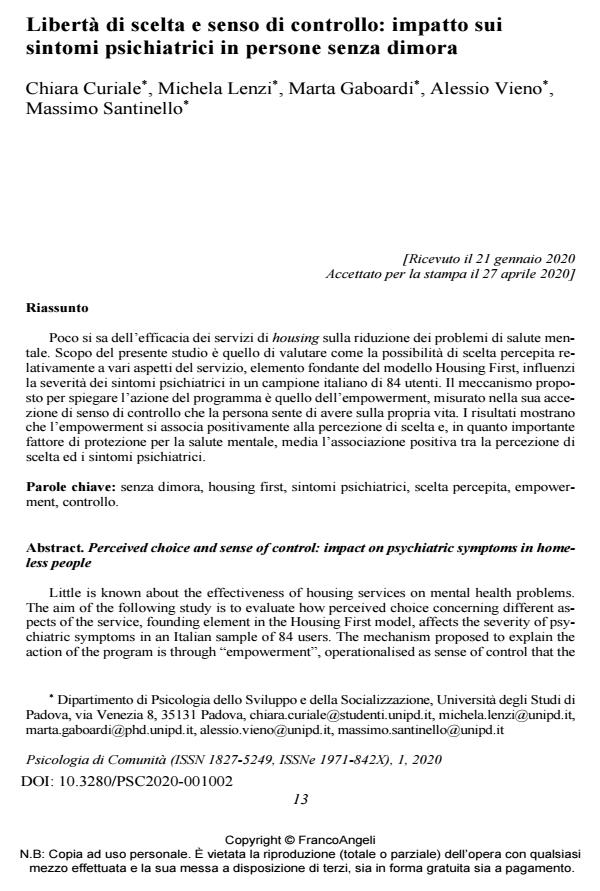Libertà di scelta e senso di controllo: impatto sui sintomi psichiatrici in persone senza dimora
Titolo Rivista PSICOLOGIA DI COMUNITA’
Autori/Curatori Chiara Curiale, Michela Lenzi, Marta Gaboardi, Alessio Vieno, Massimo Santinello
Anno di pubblicazione 2020 Fascicolo 2020/1
Lingua Italiano Numero pagine 16 P. 13-28 Dimensione file 605 KB
DOI 10.3280/PSC2020-001002
Il DOI è il codice a barre della proprietà intellettuale: per saperne di più
clicca qui
Qui sotto puoi vedere in anteprima la prima pagina di questo articolo.
Se questo articolo ti interessa, lo puoi acquistare (e scaricare in formato pdf) seguendo le facili indicazioni per acquistare il download credit. Acquista Download Credits per scaricare questo Articolo in formato PDF

FrancoAngeli è membro della Publishers International Linking Association, Inc (PILA), associazione indipendente e non profit per facilitare (attraverso i servizi tecnologici implementati da CrossRef.org) l’accesso degli studiosi ai contenuti digitali nelle pubblicazioni professionali e scientifiche.
Poco si sa dell’efficacia dei servizi di housing sulla riduzione dei problemi di salute mentale. Scopo del presente studio è quello di valutare come la possibilità di scelta percepita relativamente a vari aspetti del servizio, elemento fondante del modello Housing First, influenzi la severità dei sintomi psichiatrici in un campione italiano di 84 utenti. Il meccanismo proposto per spiegare l’azione del programma è quello dell’empowerment, misurato nella sua accezione di senso di controllo che la persona sente di avere sulla propria vita. I risultati mostrano che l’empowerment si associa positivamente alla percezione di scelta e, in quanto importante fattore di protezione per la salute mentale, media l’associazione positiva tra la percezione di scelta ed i sintomi psichiatrici.
Parole chiave:Senza dimora, housing first, sintomi psichiatrici, scelta percepita, empowerment, controllo.
- Homeless people's recovery in Housing First and Traditional Services: The role of working alliance in Italian housing services Chiara Curiale, Michela Lenzi, Marta Gaboardi, Claudia Marino, Lucia Ronconi, Silvia Demita, Roberta Cosentino, Francesca Disperati, Massimo Santinello, in Journal of Community Psychology /2023 pp.2758
DOI: 10.1002/jcop.23055 - Presentazione del numero. Empowerment and social inclusion Immacolata Di Napoli, Sara Alfieri, in PSICOLOGIA DI COMUNITA' 1/2020 pp.5
DOI: 10.3280/PSC2020-001001
Chiara Curiale, Michela Lenzi, Marta Gaboardi, Alessio Vieno, Massimo Santinello, Libertà di scelta e senso di controllo: impatto sui sintomi psichiatrici in persone senza dimora in "PSICOLOGIA DI COMUNITA’" 1/2020, pp 13-28, DOI: 10.3280/PSC2020-001002